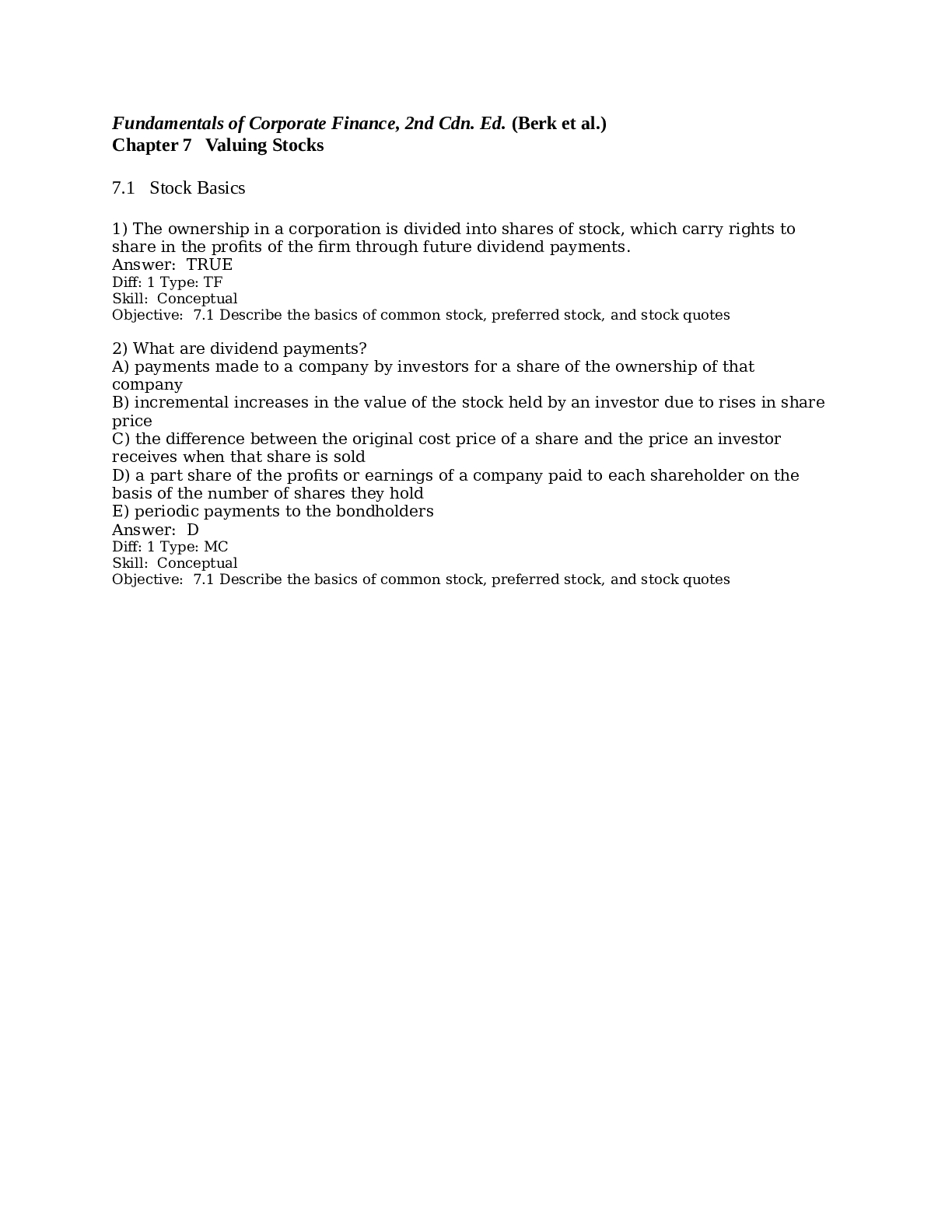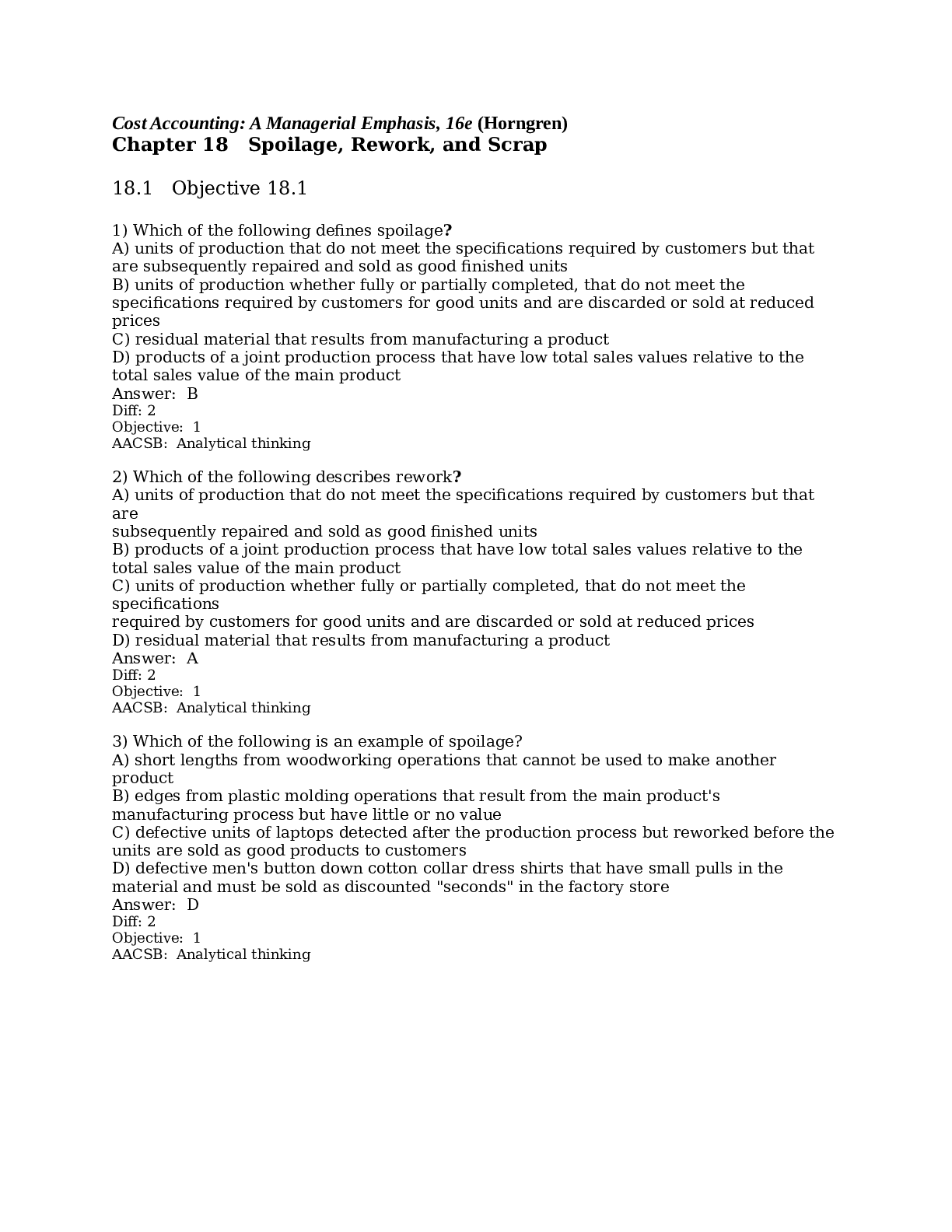Financial Accounting > QUESTIONS & ANSWERS > University of Minnesota, Duluht ACCT 3201 chapter 7 Chapter 7 Flexible Budgets, Direct-Cost Variance (All)
University of Minnesota, Duluht ACCT 3201 chapter 7 Chapter 7 Flexible Budgets, Direct-Cost Variances, and Management Control QUESTIONS AND ANSWERS
Document Content and Description Below
Cost Accounting: A Managerial Emphasis, 16e (Horngren) 1) A master budget is ________. A) a budget which starts from a zero base B) based on the level of expected output at the start of the bud... get period C) developed at the end of a period D) a type of flexible budget once actual results are known Answer: B Diff: 1 Objective: 1 AACSB: Analytical thinking 2) Management by exception is a practice whereby managers focus more closely on ________. A) variances in the larger departments B) areas not operating as anticipated and less closely on areas that are operating as anticipated C) activity-based budgeting D) unfavorable variances Answer: B Diff: 1 Objective: 1 AACSB: Analytical thinking 3) A variance is ________. A) the difference between actual fixed cost per unit and standard variable cost per unit B) the standard units of inputs for one output C) the difference between an actual result and a budgeted performance D) the difference between actual variable cost per unit and standard fixed cost per unit Answer: C Diff: 1 Objective: 1 AACSB: Analytical thinking 4) An unfavorable variance indicates that ________. A) the actual costs are less than the budgeted costs B) the actual revenues exceed the budgeted revenues C) the actual units sold are less than the budgeted units D) the budgeted contribution margin is more than the actual amount Answer: C Diff: 2 Objective: 1 AACSB: Analytical thinking5) A favorable variance indicates that ________. A) budgeted costs are less than actual costs B) actual revenues exceed budgeted revenues C) actual operating income is less than the budgeted amount D) budgeted contribution margin is more than the actual amount Answer: B Diff: 2 Objective: 1 AACSB: Analytical thinking 6) Lincoln Corporation used the following data to evaluate their current operating system. The company sells items for $19 each and used a budgeted selling price of $19 per unit. Actual Budgeted Units sold 48,000 units 39,000 units Variable costs $167,000 $152,000 Fixed costs $41,000 $50,000 What is the static-budget variance of revenues? A) $171,000 favorable B) $171,000 unfavorable C) $6,000 favorable D) $9,000 unfavorable Answer: A Explanation: Static-budget variance of revenues = (48,000 units × $19) - (39,000 units × $19) = $171,000 F Diff: 2 Objective: 1 AACSB: Application of knowledge 7) Lincoln Corporation used the following data to evaluate their current operating system. The company sells items for $18 each and used a budgeted selling price of $18 per unit. Actual Budgeted Units sold 45,000 units 31,000 units Variable costs $161,000 $150,000 Fixed costs $44,000 $50,000 What is the static-budget variance of variable costs? A) $6,000 favorable B) $11,000 unfavorable C) $14,000 favorable D) $5,000 unfavorable Answer: B Explanation: Static-budget variance of variable costs = $161,000 − $150,000 = $11,000 U Diff: 2 Objective: 1 AACSB: Application of knowledge8) Lincoln Corporation used the following data to evaluate their current operating system. The company sells items for $18 each and used a budgeted selling price of $18 per unit. Actual Budgeted Units sold 43,000 units 33,000 units Variable costs $166,000 $150,000 Fixed costs $41,000 $58,000 What is the static-budget variance of operating income? A) $164,000 favorable B) $164,000 unfavorable C) $181,000 favorable D) $181,000 unfavorable Answer: C Explanation: Actual Static Static-budget Results Budget Variance Units sold 43,000 33,000 Revenues $774,000 $594,000 $180,000 F Variable costs 166,000 150,000 16,000 U Contribution margin$608,000 $444,000 164,000 F Fixed costs 41,000 58,000 $17,000 F Operating income $567,000 $386,000 $181,000 F Diff: 3 Objective: 1 AACSB: Application of knowledge 9) Schooner Corporation used the following data to evaluate its current operating system. The company sells items for $23 each and used a budgeted selling price of $23 per unit. Actual Budgeted Units sold 171,000 units 187,000 units Variable costs $1,081,000 $1,285,000 Fixed costs $800,000 $774,000 What is the static-budget variance of revenues? A) $368,000 favorable B) $368,000 unfavorable C) $16,000 favorable D) $16,000 unfavorable Answer: B Explanation: Static-budget variance of revenues = (171,000 units × $23) − (187,000 units × $23) = $368,000 U Diff: 2 Objective: 1 AACSB: Application of knowledge10) Schooner Corporation used the following data to evaluate its current operating system. The company sells items for $25 each and used a budgeted selling price of $25 per unit. Actual Budgeted Units sold 173,000 units 181,000 units Variable costs $1,081,000 $1,285,000 Fixed costs $806,000 $770,000 What is the static-budget variance of variable costs? A) $36,000 favorable B) $36,000 unfavorable C) $204,000 favorable D) $204,000 unfavorable Answer: C Explanation: Static-budget variance of variable costs = $1,081,000 − $1,285,000 = $204,000 F Diff: 2 Objective: 1 AACSB: Application of knowledge 11) Schooner Corporation used the following data to evaluate its current operating system. The company sells items for $24 each and used a budgeted selling price of $24 per unit. Actual Budgeted Units sold 177,000 units 184,000 units Variable costs $1,090,000 $1,290,000 Fixed costs $804,000 $780,000 What is the static-budget variance of operating income? A) $8,000 favorable B) $176,000 unfavorable C) $32,000 favorable D) $7,000 unfavorable Answer: A Explanation: Actual Static Static-budget Results Budget Variance Units sold 177,000 184,000 Revenues $4,248,000 $4,416,000 $(168,000) U Variable costs 1,090,000 1,290,000 (200,000) F Contribution margin$3,158,000$3,126,000 32,000 F Fixed costs 804,000 780,000 24,000 U Operating income$2,354,000 $2,346,000 $8,000 F Diff: 3 Objective: 1 AACSB: Application of knowledge12) Daniels Corporation used the following data to evaluate their current operating system. The company sells items for $19 each and had used a budgeted selling price of $20 per unit. Actual Budgeted Units sold 280,000 units 279,000 units Variable costs $980,000 $881,000 Fixed costs $58,000 $45,000 What is the static-budget variance of revenues? A) $299,000 favorable B) $260,000 favorable C) $260,000 unfavorable D) $299,000 unfavorable Answer: C Explanation: Static-budget variance of revenues = (280,000 units × $19) − (279,000 units × $20) = $260,000 U Diff: 2 Objective: 1 AACSB: Application of knowledge 13) Daniels Corporation used the following data to evaluate their current operating system. The company sells items for $19 each and had used a budgeted selling price of $20 per unit. Actual Budgeted Units sold 280,000 units 270,000 units Variable costs $990,000 $887,000 Fixed costs $60,000 $47,000 What is the static-budget variance of variable costs? A) $116,000 favorable B) $116,000 unfavorable C) $103,000 favorable D) $103,000 unfavorable Answer: D Explanation: Static-budget variance of variable costs = $990,000 − $887,000 = $103,000 U Diff: 2 Objective: 1 AACSB: Application of knowledge14) Daniels Corporation used the following data to evaluate their current operating system. The company sells items for $18 each and had used a budgeted selling price of $19 per unit. Actual Budgeted Units sold 280,000 units 278,000 units Variable costs $960,000 $886,000 Fixed costs $60,000 $51,000 What is the static-budget variance of operating income? A) $325,000 favorable B) $325,000 unfavorable C) $316,000 favorable D) $316,000 unfavorable Answer: B Explanation: Actual Static Static-budget Results Budget Variance Units sold 280,000 278,000 Revenues $5,040,000 $5,282,000 $(242,000) U Variable costs 960,000 886,000 (74,000) U Contribution margin $4,080,000$4,396,000 316,000 U Fixed costs 60,000 51,000 9,000 U Operating income$4,020,000 $4,345,000 $325,000 U Diff: 3 Objective: 1 AACSB: Application of knowledge 15) Johnson Company had planned for operating income of $10 million in the master budget with a contribution margin of $3 million, but actually achieved operating income of only $7 million and a contribution margin of $2.5 million. A) The static-budget variance for operating income is $3 million favorable. B) The static-budget variance for operating income is $3 million unfavorable. C) The flexible-budget variance for operating income is $3 million favorable. D) The flexible-budget variance for operating income is $3 million unfavorable. Answer: B Diff: 2 Objective: 1 AACSB: Analytical thinking 16) A master budget is called a static budget because it is developed around a single [Show More]
Last updated: 2 years ago
Preview 1 out of 68 pages

Buy this document to get the full access instantly
Instant Download Access after purchase
Buy NowInstant download
We Accept:

Reviews( 0 )
$15.00
Can't find what you want? Try our AI powered Search
Document information
Connected school, study & course
About the document
Uploaded On
Jul 09, 2021
Number of pages
68
Written in
Additional information
This document has been written for:
Uploaded
Jul 09, 2021
Downloads
0
Views
121









.png)

.png)















